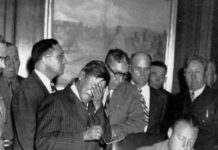The social media community in Nigeria went wild when the Kano State Governor, Umar Ganduje, deposed the then Emir of Kano, Sanusi Lamido Sanusi II.
The centre of the argument in the digital space was the possibility of a governor dethroning a traditional ruler as prominent as an Emir.
Many argued that it was impossible to happen. Some even said the dethronement of Emir Sanusi is the first or second in the history of Nigeria. Well, it isn’t.
A definite reason for dethronement cannot be ascertained, but it often ranges from conflicts with the executive authority which often leads to official pronouncements of dethronement, self-exiled, or sometimes removal by court injunctions – which we will see.
Sometimes, dethronement might be caused by revolts or agitation among subjects as a result of displeasure with reigns, or allegations of misbehaviour and misconduct.
Below is a list of kings that have been dethroned in Nigeria, as gathered by Daily Times:
Ooni of Ife – Ogboru
Ooni Ogboru was the 19th-century Ooni of Ife. He was maliciously dethroned by Ife Palace Chiefs who found his 70yrs long reign unpalatable. He was subtly deceived to exit the palace to see something at the Atiba square of the ancient Ile-Ife town. The chiefs then permanently locked him out of the palace.
Angry Ogboru left the palace vicinity in search of a new home. He founded a little town called Ife-Odan and he settled there. The unjust treatment meted out to him seemed to have open the palace to ill luck because, after his maltreatment, six successive Ooni died in the space of six months after his unlawful exit.
Ife Chiefs regretted their actions, went to Ife-Odan in a bid to convince him to return home to take his rightful place. Unfortunately, Ooni Ogboru was no longer interested in the throne. He had already embraced his new home and was enjoying the ambience and people. After much imploration, he nominated his son, Giessi, to become the next Ooni.
PS: The present Ooni of Ife, Ojaja II is from the Gieesi ruling house. This should dissolve the doubts and eliminate the rumours peddled by some factions that he isn’t from the royal line.
Oba of Benin Ovoranwen Nogbaisi
Oba Ovoranwen was deposed by the British government in 1897 under Vice-Consul Phillips Roberts for monopolizing forms of trade which the British government found displeasing. The Consul tried to forcefully invade the Oba’s palace but the plan was thwarted by palace emissaries. The two British messengers were ambushed and killed.
The action displeased the military that was led by Harry Hawson and attracted a cruel consequence of forceful invasion and utter destruction of the Benin empire. Benin City was destroyed and the palace was heavily looted. The Oba was dethroned and sentenced to death by hanging. He was lucky to escape and was sent on exile in a small town in Calabar called Essien. He died there in 1914.
Olu of Warri – Erejuwa I
Erejuwa I was the traditional ruler of Itsekiri from 1951-1964, then he returned for a second spell between 1966 – 1989. He was a senior officer with UAC before becoming a king. In 1964 – his first reign – he was deposed by the then eastern party, NCNC, because of his support for Awolowo’s Action group.
He was exiled to a town called Ogbesse. He was reinstated by the military government of David Ejoor in 1966 and he reigned till 1989.
Alaafin of Oyo – Oba Adediran Adeyemi II
Oba Adediran Adeyemi II (the father of the present Alaafin of Oyo, Oba Lamidi Adeyemi) was 84 years old when he was dethroned. His unfortunate dethronement was the consequence of his political rivalry with Chief Awolowo, the then leader of the Western Government of Nigeria. The Alaafin pledged allegiance to the opposition party, NCNC, led by Chief Nnamdi Azikwe.
The ‘final nail to the coffin’ of his dethronement was hammered when he disagreed with the then Action group leader, Bode Thomas.
Oba Adediran was sent on exile to Lagos. Gbadegesin Ladigbolu was enthroned as the new Alaafin of Oyo till 1970.
Awujale of Ijebu – Oba Adenuga Folagbade
Awujale Adenuga Folagbade ascended the throne at the age of thirty-three in November 1925. He lived with his mother in Igbeba, a small village near Ijebu Ode. He was unanimously chosen by the “Odi” (Ijebu kingmakers) from the Tunwase ruling house but the choice wasn’t welcomed by local chiefs because they felt he was too young to ascend the throne.
He was eventually deposed and exiled to Ilorin in 1929 on corruption charges bordering around forestry fees. He was succeeded by Oba Ogunnaike.
Olowo of Owo – Oba Olateru Olagbegi II
Oba Olateru Olagbegi II is the richest and most influential Olowo of Owo town in Ondo state. He ascended the throne of his ‘ancestors’ in 1941 and reigned till 1966. His troubles began when he picked Chief S.L. Akintola over his ally, Chief Obafemi Awolowo.
There has been a long battle in Owo town and in the palace, perhaps because Awolowo’s Action Group was founded in the Olowo palace.
The long battle culminated in 1966 after a cold-blooded coup that resulted in a loss of lives and properties. The people of Owo revolted their King and sent him on exile for another 27 years, and Oba Ogunoye was installed in his stead.
Following the demise of Ogunoye, Olateru was reappointed for a second spell in 1993. He was king for another 5 years till his demise in 1998. His eldest son took over from him in 1999 and reigned for 20 years.
Emir of Kano – Sir Mohammodu Sanusi I
Sir Mohammodu Sanusi, I was very influential in the pre-colonial days of Northern Nigeria. He was the Emir of Kano between 1954 and 1963. He was deposed by Alhaji Ahmadu Bello, a distant cousin, after an allegation of financial misappropriation in the emirate.
He was then banished to Azare in 1964 and eventually died at Wudil. Sanusi I is the grandfather of Sanusi Lamido Sanusi, the recently deposed Emir of Kano who reigned from 2014 to 2020, and suffered the same fate as his grandfather.
Oba of Lagos – Ibikunle Akintoye and Kosoko
Oba Ibikunle Akintoye reigned twice as Oba of Lagos. His first spell was between 1841 to 1845. He was deposed and banished to Badagry town for advocating against the slave trade.
He was succeeded by Oba Kosoko who was equally deposed for refusing to willfully submit the Lagos colony to the British. In retaliation for his stubbornness, the British government brought back Ibikunle Akintoye who had been on exile in Egba and Badagry in 1851.
Ibikunle’s second spell ended in September 1853 following his death. Oba Dosumu succeeded Ibikunle.
Oba Kosoko was later recalled to Lagos, where he was made a High Chief Oloja of Eleko in Oshodi tapa Epetedo. He lived there until his death in 1872.
Timi of Ede – Abibu Lagunju
Timi Abibu Languju holds the record of being the first Muslim-Yoruba king in history. He reigned from 1855 to 1892 and was deposed and exiled by the British government to Ibadan.
At Ibadan, he was welcomed by Sunmonu Apampa, the then Asipa of Ibadan. He lived with the Asipa until his death in 1900.
Sultan of Sokoto – Ibrahim Dasuki
Late Sultan Dasuki was dethroned by the military government of General Sanni Abacha in 1996. His dethronement attracted attention from all over the country.
Ibrahim Dasuki’s removal was rumoured to be related to issues between him and Abacha, on mismanagement of the late Abacha’s relative’s properties. There were also speculations that it was due to reports of his modernist style of rulership and many preferred Sultan Maccido, who later succeeded him.
Other Kings dethroned are:
Emir of Kano, Aliyu Ibn Abdullahi Maje Karofi;
Akarigbo of Remo – Oyebajo;
Alase of Remo, High Chief Awolesi;
Osemawe of Ondo – Oba Adekolurejo Jimosun II (Otutubiosun);
Osemawe of Ondo – Oba Adenuga Fidipote II;
Emir of Gwandu – Mustapha Jokolo;
Emir of Ningi – Dan Yaya;
Olofa of Offa – Oba Wuraola Isioye;
Emir of Bauchi – Umar Mohammed;
Deji of Akure – Oba Oluwadamilare Adesina Osupa III;
Oba Awujale Sikiru Adetona;
Onojie of Uromi Kingdom – Anslem Aidenojie;
Olupoti of Ipoti Ekiti – Oba Oladele Ayeni and:
Eleruwa of Eruwa, Oba Samuel Adebayo Adegbola.
Follow the Neptune Prime channel on WhatsApp:
Do you have breaking news, interview request, opinion, suggestion, or want your event covered? Email us at neptuneprime2233@gmail.com





